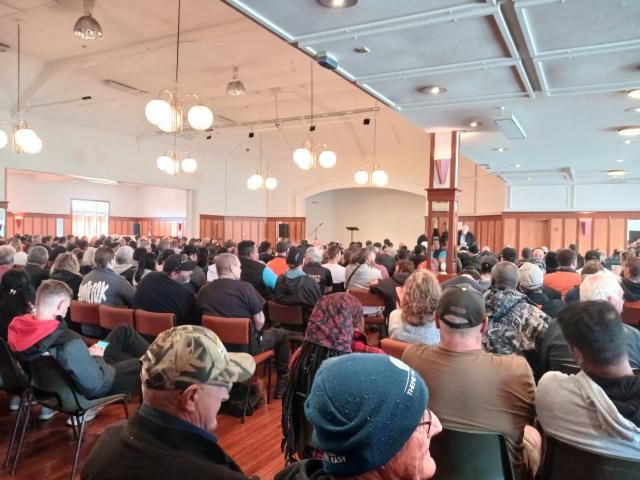Updated on: October 14, 2024 9:01 pm GMT
Over 600 employees at the Smithfield plant in Timaru are bracing for a challenging future as Alliance Group has proposed the plant’s closure by the end of this year. The move is expected to have significant repercussions on the local economy, raising concerns among civic leaders and workers alike.
Closure Proposal: A Local Concern
Alliance Group, the cooperative that operates the Smithfield plant, has cited a decline in livestock availability resulting from land-use changes as the primary reason for the proposed closure. If confirmed, sheep meat, calf, and night shift venison processing would cease at the historic South Canterbury facility, which has been in operation since 1989.
Mayor of Timaru, Nigel Bowen, voiced his dismay over the potential closure, stating, “This is massive. This is a town that has been built on these two freezing works.” The loss of the plant would not only put jobs at risk but also challenge the economic stability of a town with a population of about 50,000.
Impacts on Employment
The proposed closure could affect nearly all of the 600 employees working at the Smithfield plant. Daryl Carran, national secretary of the Meatworkers Union, commented on the upcoming decision, emphasizing the possibility of job losses. “Inevitably, I think we know with the declining stock numbers, that was the main reason for today’s announcement,” he said.
For many workers, including those who have recently purchased homes and support young families, the announcement has hit hard. One employee described the news as “gut-wrenching, heartbreaking,” showing the profound impact that the plant’s closure could have on the local community.
Alliance Group’s Justification
Alliance Group has stated that the decision is part of a broader strategy to align its operations with livestock availability. Chief Executive Willie Wiese explained, “This proposal aims to align our operations with current livestock availability, ensuring we have the right scale and cost structure to meet future demands as a leading red meat processor.”
The Smithfield plant, which is 139 years old, also requires significant investment for repairs, further complicating its operational viability. Alliance’s financial struggles, highlighted by a loss of nearly $98 million in the year ending September 2023, further reinforce the necessity of reviewing operational capacities.
The Community’s Reaction
Local leaders and community advocates are concerned about the cascading effects this closure could have, both economically and socially. “You can talk about the economic impact, but it is equally there is the social impact,” said Nigel Davenport, chief executive of Venture Timaru. The significance of the freezing works to Timaru’s identity and economy cannot be overstated.
With the proposal currently under consultation, Alliance indicated that affected employees would be offered the opportunity to apply for other roles within the company if the closure goes ahead. Still, it is anticipated that many would face redundancy.
Looking Ahead
As the community awaits the final decision, tensions remain high. The looming uncertainty raises questions about the future job prospects for hundreds of affected workers and the overall economic health of Timaru.
The consultation process must conclude before any final decisions are made, with feedback expected to shape the outcome. Alliance is committed to providing clarity to staff before the upcoming sheep meat processing season, which typically begins in December.
The financial landscape for Alliance Group remains precarious, as they confront challenges like declining livestock numbers, changing market demands, and inflationary pressures. As Wiese noted, without a clear strategy moving forward, the need to adjust their operations is crucial for long-term success.
Ultimately, the community at Timaru faces an uncertain future, waiting to learn whether a historic institution and vital source of employment will cease to exist. Such a decision could leave lasting scars on the town, affecting both its economy and its people.
The Broader Impact of Meat Processing Declines
The closure of the Smithfield plant is not an isolated event but part of a broader trend in the meat processing industry. Spanning various regions, many plants are facing similar challenges, primarily due to decreased livestock availability and changing land uses across agricultural landscapes.
As more facilities confront these dilemmas, the ripple effects can be seen across local communities. This situation raises critical questions about sustainable agricultural practices and the future of meat processing in New Zealand.
Municipalities must strike a balance between agricultural development and economic stability, ensuring that livelihoods are protected while also adapting to changing market conditions.
As the Smithfield plant’s fate hangs in the balance, the urgency of finding solutions becomes ever more evident. The workers, their families, and the community at large await clarity—and hope for a future that does not forget the importance of their historical meat processing heritage.
For those interested, further developments can be followed closely as the situation unfolds, including the consultation process and any potential re-deployment opportunities at other Alliance facilities.
Meat processing plants are important for our food supply. When these plants close, it can cause big problems for farmers and workers. Many people might lose their jobs, and farmers may struggle to sell their animals. This can lead to higher meat prices in stores. It’s important to understand how these closures affect everyone in the community.
